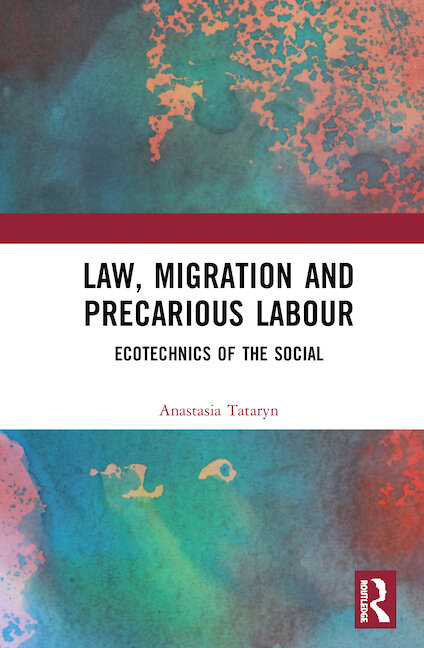Available in print and ebook
Law, Migration and Precarious Labour: Ecotechnics of the Social
Routledge Taylor Francis ISBN 9781138700499
Providing a radical new approach to labour migration, this book challenges the prevailing legal and political construction of the figure of the irregular migrant labourer, whilst at the same time reimagining this irregularity as the basis of an alternative, post-capitalist, sociality.
'Through Jean Luc Nancy’s work on ecotechnics, Tataryn links the political dimension of migration with geopolitical, technological, legal, philosophical, and broadly understood ecological concepts, and allows us to imagine a new material and embodied way of conceptualising migration and thereby resisting easy neoliberal constructions. It shows how migration is not an isolated phenomenon but the inescapable sense of our ontological condition. This is a profoundly topical book, unapologetically putting labour migration at the forefront of the contemporary global political move to the right, and offering strategies of resistance that question the usual preponderance of the market, the nation-state and the law.'
– Andreas Philippopoulos-Mihalopoulos, Professor of Law & Theory, University of Westminster, UK
The text draws on the work of contemporary philosopher Jean-Luc Nancy, and more specifically his term ‘ecotechnics’, in order to examine how economic, political and juridical norms deny the full legal status of certain people who are deemed to be irregular. This ostensible irregularity is revealed as a regular feature of labour market practice, and a necessary support for the conceptual foundations of capitalist legality. As this book shows, however, this legality – and with it, the technological subordination of life to the circulation of capital as if this were the only possibility for our being in the world – is not insurmountable. The book’s consideration of the figure of the irregular migrant labourer comes to provide an alternative basis for reimagining our relationship not only to migration and to labour itself, but ultimately to each other.
This powerful analysis of contemporary labour migration is of considerable interest to legal and political theorists, philosophers, labour lawyers, migration experts, and others with theoretical, political or policy interests in this area.
